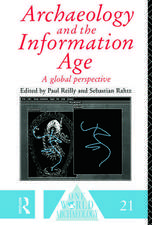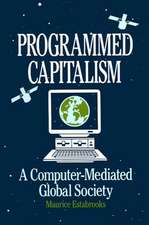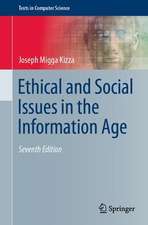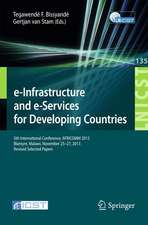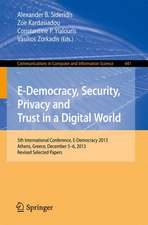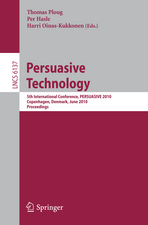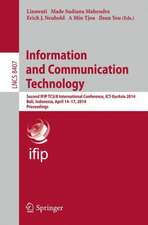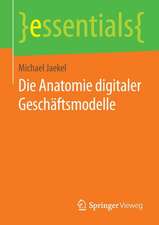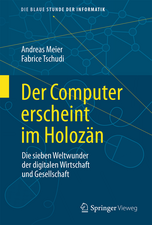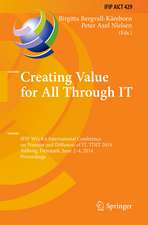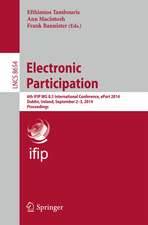Ethics in Cyberspace: How Cyberspace May Influence Interpersonal Interaction
Autor Thomas Plougen Limba Engleză Hardback – 15 mai 2009
| Toate formatele și edițiile | Preț | Express |
|---|---|---|
| Paperback (1) | 590.31 lei 38-44 zile | |
| SPRINGER NETHERLANDS – 19 oct 2010 | 590.31 lei 38-44 zile | |
| Hardback (1) | 655.85 lei 6-8 săpt. | |
| SPRINGER NETHERLANDS – 15 mai 2009 | 655.85 lei 6-8 săpt. |
Preț: 655.85 lei
Preț vechi: 819.82 lei
-20% Nou
Puncte Express: 984
Preț estimativ în valută:
125.50€ • 131.30$ • 104.25£
125.50€ • 131.30$ • 104.25£
Carte tipărită la comandă
Livrare economică 02-16 aprilie
Preluare comenzi: 021 569.72.76
Specificații
ISBN-13: 9789048123698
ISBN-10: 9048123690
Pagini: 240
Ilustrații: IX, 223 p.
Dimensiuni: 155 x 235 x 19 mm
Greutate: 0.7 kg
Ediția:2009
Editura: SPRINGER NETHERLANDS
Colecția Springer
Locul publicării:Dordrecht, Netherlands
ISBN-10: 9048123690
Pagini: 240
Ilustrații: IX, 223 p.
Dimensiuni: 155 x 235 x 19 mm
Greutate: 0.7 kg
Ediția:2009
Editura: SPRINGER NETHERLANDS
Colecția Springer
Locul publicării:Dordrecht, Netherlands
Public țintă
ResearchCuprins
Preface. I The basic premise. 1. Ethics in Cyberspace. 1.1 Introduction. 2. The basic premise revisited. 2.1 Shortcomings of the basic premise. 2.2 The basic premise. II Action, explanation and cyberspace. 3. Actions and explanations. 3.1 Actions and reasons. 3.2 Explaining the basic premise. 4. Interaction in Cyberspace. 4.1 Cyberspace: Infrastructure and interaction. 4.2 Key properties of cyberspatial interaction. III Explaining the basic premise. 5. Belief and particularity. 5.1 Structure of analysis. 5.2 The three hypotheses. 6. Belief and reality. 6.1 Hypothesis I: Reality and determinateness. 6.2 Hypothesis II: Reality, causality and life-world. 6.3 Hypothesis III: Reality and vulnerability. 6.4 Hypotheses I to III: Beliefs and evidence. 7. Belief and evidence. 7.1 Evidence in cyberspatial interaction. 8. Belief and action. 8.1 Belief, reality and ethics. 8.2 Explaining the moral difference in interaction. 9. Concluding remarks. 9.1 Alternative explanations and interpretations. Bibliography. Index.
Recenzii
From the reviews:
"This book will interest students of modern ethics, psychology, and the human factors of cyberspace. … Ploug’s work is best suited for a graduate seminar. … if there is a need for face time in ethics and human interactions, this book is a valuable first step." (Brad Reid, ACM Computing Reviews, October, 2009)
“A book on the ethics of interactions in cyberspace is both timely and important. … written in three sections, nine chapters and is designed to appeal to different readerships. … Ploug … more interested in ethical theory. His interest is in the logical relationships between different properties in cyberspace, how we establish and act on our beliefs about others, our beliefs about the world … . To my mind, these are all important questions of epistemology, including for phenomenologists.” (Erich von Dietze, Metapsychology Online Reviews, Vol. 14 (12), March, 2010)
"This book will interest students of modern ethics, psychology, and the human factors of cyberspace. … Ploug’s work is best suited for a graduate seminar. … if there is a need for face time in ethics and human interactions, this book is a valuable first step." (Brad Reid, ACM Computing Reviews, October, 2009)
“A book on the ethics of interactions in cyberspace is both timely and important. … written in three sections, nine chapters and is designed to appeal to different readerships. … Ploug … more interested in ethical theory. His interest is in the logical relationships between different properties in cyberspace, how we establish and act on our beliefs about others, our beliefs about the world … . To my mind, these are all important questions of epistemology, including for phenomenologists.” (Erich von Dietze, Metapsychology Online Reviews, Vol. 14 (12), March, 2010)
Textul de pe ultima copertă
Over the last few decades information and communication technology has come to play an increasingly prominent role in our dealings with other people. Computers, in particular, have made available a host of new ways of interacting, which we have increasingly made use of. In the wake of this development a number of ethical questions have been raised and debated. Ethics in Cyberspace focuses on the consequences for ethical agency of mediating interaction by means of computers, seeking to clarify how the conditions of certain kinds of interaction in cyberspace (for example, in chat-rooms and virtual worlds) differ from the conditions of interaction face-to-face and how these differences may come to affect the behaviour of interacting agents in terms of ethics.
Thomas Ploug’s book is a very significant contribution to the literature of applied ethics. It provides an original and fascinating account of the morally relevant features of interaction in cyberspace and explains the implications that these features have for the moral judgements of agents involved in such interaction. As Ethics in Cyberspace illustrates, cyberspatial interaction raises new ethical challenges that need to be met head-on. This book is indispensable to anyone interested in the application of ethical principles in the modern world.
Professor Søren Holm, PhD, DMed, Cardiff Law School and University of Oslo. Editor-in-Chief, Journal of Medical Ethics
Thomas Ploug’s Ethics in Cyberspace contains a meticulously argued analysis of the ethically relevant differences between interaction inside and outside cyberspace. Ploug’s main focus is on interaction in chat-rooms and various kinds of tele-operation, but the theoretical approach formulated in the book has much wider applicability. Ploug offers an admirably clear conceptual framework and investigates a range of approaches to the subject, all of which will be useful for anyone seeking todevelop a philosophical analysis of the moral aspects of interaction in cyberspace. I have no hesitation in recommending this book highly.
Professor Peter Øhrstrøm, PhD, DSc, Information Science, Aalborg University, Denmark. Author of Temporal Logic (Kluwer Academic Publishers, 1995) and co-editor of Arthur N. Prior: Papers on Time and Tense (Oxford University Press, 2003)
Thomas Ploug’s book is a very significant contribution to the literature of applied ethics. It provides an original and fascinating account of the morally relevant features of interaction in cyberspace and explains the implications that these features have for the moral judgements of agents involved in such interaction. As Ethics in Cyberspace illustrates, cyberspatial interaction raises new ethical challenges that need to be met head-on. This book is indispensable to anyone interested in the application of ethical principles in the modern world.
Professor Søren Holm, PhD, DMed, Cardiff Law School and University of Oslo. Editor-in-Chief, Journal of Medical Ethics
Thomas Ploug’s Ethics in Cyberspace contains a meticulously argued analysis of the ethically relevant differences between interaction inside and outside cyberspace. Ploug’s main focus is on interaction in chat-rooms and various kinds of tele-operation, but the theoretical approach formulated in the book has much wider applicability. Ploug offers an admirably clear conceptual framework and investigates a range of approaches to the subject, all of which will be useful for anyone seeking todevelop a philosophical analysis of the moral aspects of interaction in cyberspace. I have no hesitation in recommending this book highly.
Professor Peter Øhrstrøm, PhD, DSc, Information Science, Aalborg University, Denmark. Author of Temporal Logic (Kluwer Academic Publishers, 1995) and co-editor of Arthur N. Prior: Papers on Time and Tense (Oxford University Press, 2003)
Caracteristici
Addresses issues of life on the net key to anyone interested in understanding this phenomenon Advances highly original views as to key determinants of life on the net Is one of few books dealing with the ethical consequences of interacting on the net rather than face-to-face Applies advanced philosophical analysis in the study of life on the net The philosophical approach taken warrants strictness and clarity of analysis





